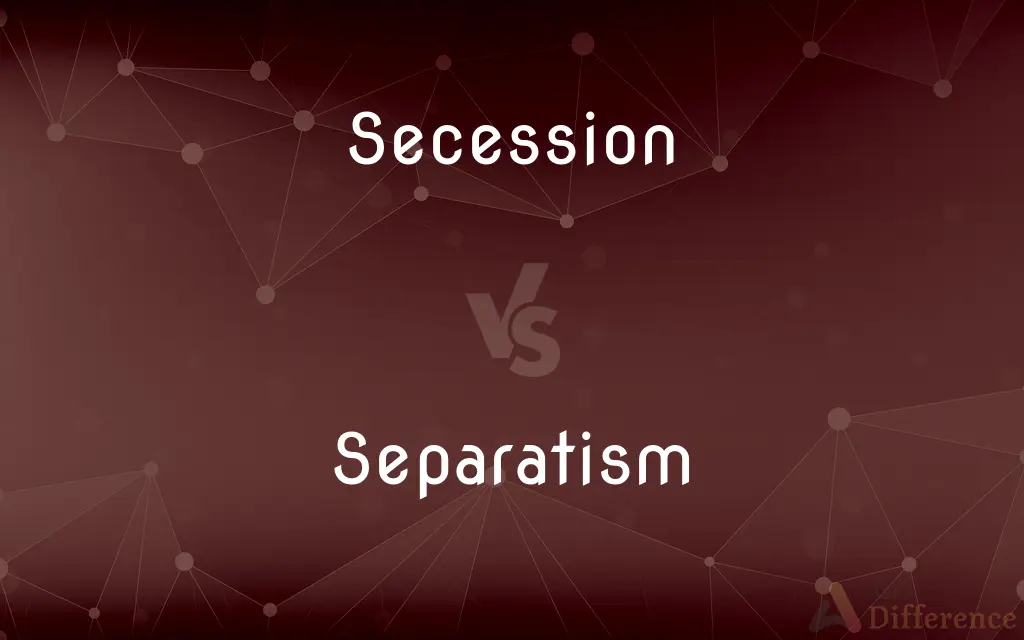Secession vs. Separatism — What's the Difference?
Edited by Tayyaba Rehman — By Fiza Rafique — Published on October 3, 2023
Secession refers to the formal withdrawal from an organization or federation, while Separatism is the advocacy for or pursuit of such a withdrawal.

Difference Between Secession and Separatism
Table of Contents
ADVERTISEMENT
Key Differences
Secession and Separatism are both associated with the idea of withdrawal or breaking away from a larger entity. Secession is the act itself, the formal process of leaving or separating from a larger organization, federation, or country. For example, when a state officially declares its intention to leave a country and become independent, that is secession.
On the other hand, Separatism is more about the ideology or movement behind such desires to separate. It encompasses the beliefs, ideas, and advocacy that fuel desires for secession. While secession is an act or event, separatism is a broader concept representing the motivation and sentiments pushing for that act.
Another way to look at it is by considering secession as the end result or culmination of separatist sentiments. Separatist groups or individuals may push for secession as a solution to perceived disparities or grievances. Not all expressions of separatism, however, lead to secession. It's possible for separatist movements to exist without resulting in the formal act of breaking away.
In a historical context, secession has been a tool used by regions or states to assert their independence or autonomy. Separatism, meanwhile, has been the driving force or ideology behind such actions, fueled by cultural, ethnic, religious, or political differences. While they are closely related and often used interchangeably, understanding the nuances between Secession and Separatism provides clarity on the stages and components of regional or national breakaways.
Comparison Chart
Nature
The act or process
The ideology or movement
ADVERTISEMENT
Manifestation
Formal declaration or action
Beliefs, sentiments, advocacy
Scope
Specific event or outcome
Broader concept encompassing motivations
Example of Entity Involved
A state declaring independence from a country
Groups or individuals advocating for a region's autonomy or freedom
Outcome
Can result in a new, independent entity
Can lead to secession but doesn't always
Compare with Definitions
Secession
An official declaration of independence by a region.
The secession of Catalonia from Spain has been a contentious issue.
Separatism
Advocacy for the separation of a group or region from a larger entity.
Separatism in Eastern Europe has historical roots.
Secession
The act of breaking away from a larger entity.
The secession movement has been gaining momentum in recent years.
Separatism
A broader concept representing motivations for secession.
Despite the challenges, separatism continues to influence global politics.
Secession
The culmination of desires to establish separate governance.
Historical secession movements have reshaped world maps.
Separatism
The beliefs or sentiments driving secession movements.
Cultural and linguistic differences often fuel separatism.
Secession
A successful or attempted split from a central authority.
Secession efforts in various countries have had mixed results.
Separatism
The ideology behind movements seeking autonomy or independence.
Separatism can arise from religious or ethnic differences.
Secession
The formal withdrawal from an organization or federation.
The secession of the southern states led to the American Civil War.
Separatism
One who secedes or advocates separation from a group, as from a nation or an established church.
Secession
The act of seceding.
Separatism
One who advocates cultural, ethnic, or racial separation.
Secession
Often Secession The withdrawal of 11 Southern states from the Union in 1860-1861, precipitating the US Civil War.
Separatism
A theory or doctrine which supports a state of separation between organizations, institutions, or other societal groups (e.g. between church and state) or between different political jurisdictions (e.g. a country and its former colony).
She wrote an essay expounding the tenets of Scottish separatism.
Secession
The act of seceding.
That year, secession was enacted on account of unreasonable policies.
Separatism
The practice of treating members of different societal groups in a politically, legally, or economically different manner.
Apartheid was a government-enforced form of separatism in which people received unequal social benefits based on race.
Secession
The act of seceding; separation from fellowship or association with others, as in a religious or political organization; withdrawal.
Separatism
The character or act of a separatist; disposition to withdraw from a church; the practice of so withdrawing.
Secession
The withdrawal of a State from the national Union.
Separatism
A social system that provides separate facilities for minority groups
Secession
An Austrian school of art and architecture parallel to the French art nouveau in the 1890s
Separatism
A disposition toward schism and secession from a larger group; the principles and practices of separatists;
Separatism is a serious problem in Quebec
Demands for some form of separatism on grounds of religion have been perceived as a threat to mainstream education
Secession
The withdrawal of eleven Southern states from the Union in 1860 which precipitated the American Civil War
Separatism
A push for distinct governance or autonomy.
The rise of separatism can be a response to perceived oppression.
Secession
Formal separation from an alliance or federation
Common Curiosities
What fuels separatist sentiments?
Cultural, linguistic, religious, economic, or political differences can fuel separatism.
Are there legal routes to secession?
It varies by country; some constitutions may allow it, while others prohibit secession.
Can separatism lead to secession?
Yes, separatist movements can lead to secession, but not always.
Are all separatist movements violent?
No, while some might resort to violence, many seek peaceful dialogue and negotiation.
How do governments typically respond to separatism?
Responses vary, from negotiation and accommodation to suppression and resistance.
Is separatism always about creating a new country?
Not always. It can also be about gaining more autonomy within an existing nation.
Has secession been common in history?
There have been notable instances of secession, but it's not an everyday occurrence.
Is secession the same as separation?
Not exactly; secession is a formal withdrawal, often from a country or federation, while separation can be more general.
Can a region revert its secession?
In theory, yes, but it would require legal and often international agreements.
Can secession happen without a separatist movement?
It's unlikely, as secession usually stems from some form of separatist sentiment.
Do international bodies like the UN have a stance on secession?
The UN prioritizes territorial integrity but also recognizes the right to self-determination.
Is separatism a modern phenomenon?
No, there have been separatist sentiments and movements throughout history.
Why do some regions seek secession?
Reasons can include cultural preservation, economic benefits, or escape from perceived oppression.
How is separatism expressed?
Through political movements, protests, advocacy, or even cultural expressions.
Can secession result in civil war?
It's possible, as seen in history, but outcomes depend on various political, cultural, and economic factors.
Share Your Discovery

Previous Comparison
Moisturizer vs. Cream
Next Comparison
Micro Marketing vs. Macro MarketingAuthor Spotlight
Written by
Fiza RafiqueFiza Rafique is a skilled content writer at AskDifference.com, where she meticulously refines and enhances written pieces. Drawing from her vast editorial expertise, Fiza ensures clarity, accuracy, and precision in every article. Passionate about language, she continually seeks to elevate the quality of content for readers worldwide.
Edited by
Tayyaba RehmanTayyaba Rehman is a distinguished writer, currently serving as a primary contributor to askdifference.com. As a researcher in semantics and etymology, Tayyaba's passion for the complexity of languages and their distinctions has found a perfect home on the platform. Tayyaba delves into the intricacies of language, distinguishing between commonly confused words and phrases, thereby providing clarity for readers worldwide.













































